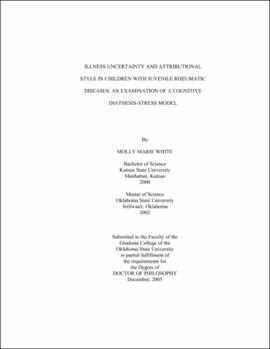| dc.contributor.advisor | Chaney, John M. | |
| dc.contributor.author | White, Molly Marie | |
| dc.date.accessioned | 2013-11-26T08:27:47Z | |
| dc.date.available | 2013-11-26T08:27:47Z | |
| dc.date.issued | 2005-12 | |
| dc.identifier.uri | https://hdl.handle.net/11244/6987 | |
| dc.description.abstract | Scope and Method of Study: The present study attempted to examine the influences of children's causal attributions for disease unrelated events on depression under varying levels of perceived illness uncertainty in a sample of children with juvenile rheumatic disease (JRD). Participants were 50 (31 females; 19 males) children and adolescents between the ages of nine and 17 (M = 13.62; SD = 2.42) and their parents. Participants were recruited through the Pediatric Rheumatology Clinic at the Children's Hospital of Oklahoma in Oklahoma City, Oklahoma. The physician completed a Provider Questionnaire, which was designed to obtain patient information regarding diagnoses, date of diagnoses, and current disease activity. Parents completed the Brief Symptom Inventory (BSI; Derogatis & Melisaratos, 1983) while either in the clinic or through packets mailed to the participant's home. Children completed a background information questionnaire, the Children's Depression Inventory (CDI; Kovacs, 1983; 1992), the Children Uncertainty in Illness Scale (CUIS; Mullins & Hartman, 1995), and the Children's Attributional Style Questionnaire-Revised (CASQ-R; Kaslow & Nolen-Hoeksema, 1991). | |
| dc.description.abstract | Findings and Conclusions: Results of the present study revealed main effect relationships between the three primary attribution dimensions (global negative, stable negative, and internal negative) and depression. Further, although no main effect of illness uncertainty on CDI depression was observed, results supported illness uncertainty as a moderator in the global negative attribution-depression relationship. These findings suggest the need to focus on examining cognitive variables in the adjustment process. Specifically, interventions should focus on minimizing pervasive negative attributions by increasing positive experiences in disease unrelated areas of their lives. Because illness uncertainty also appears to be a critical factor in determining psychological outcome in children and adolescents with JRD, results suggest that clinical interventions should focus on providing the family with sufficient information about the disease course, which may result in more realistic disease expectations and decreased child depression. | |
| dc.format | application/pdf | |
| dc.language | en_US | |
| dc.rights | Copyright is held by the author who has granted the Oklahoma State University Library the non-exclusive right to share this material in its institutional repository. Contact Digital Library Services at lib-dls@okstate.edu or 405-744-9161 for the permission policy on the use, reproduction or distribution of this material. | |
| dc.title | Illness uncertainty and attributional style in children with juvenile rheumatic diseases: An examination of a cognitive diathesis-stress model | |
| dc.contributor.committeeMember | Sullivan, Maureen A. | |
| dc.contributor.committeeMember | Mullins, Larry L. | |
| dc.contributor.committeeMember | Romans, John S. C. | |
| osu.filename | White_okstate_0664D_1560.pdf | |
| osu.accesstype | Open Access | |
| dc.type.genre | Dissertation | |
| dc.type.material | Text | |
| thesis.degree.discipline | Psychology | |
| thesis.degree.grantor | Oklahoma State University | |
